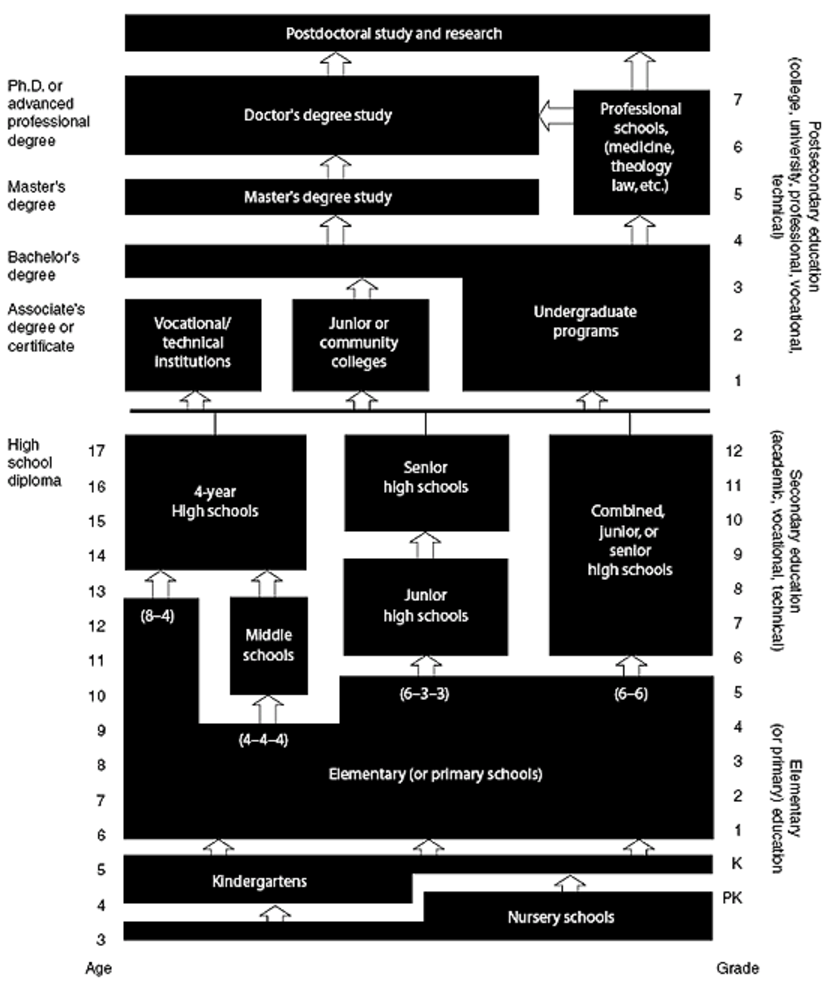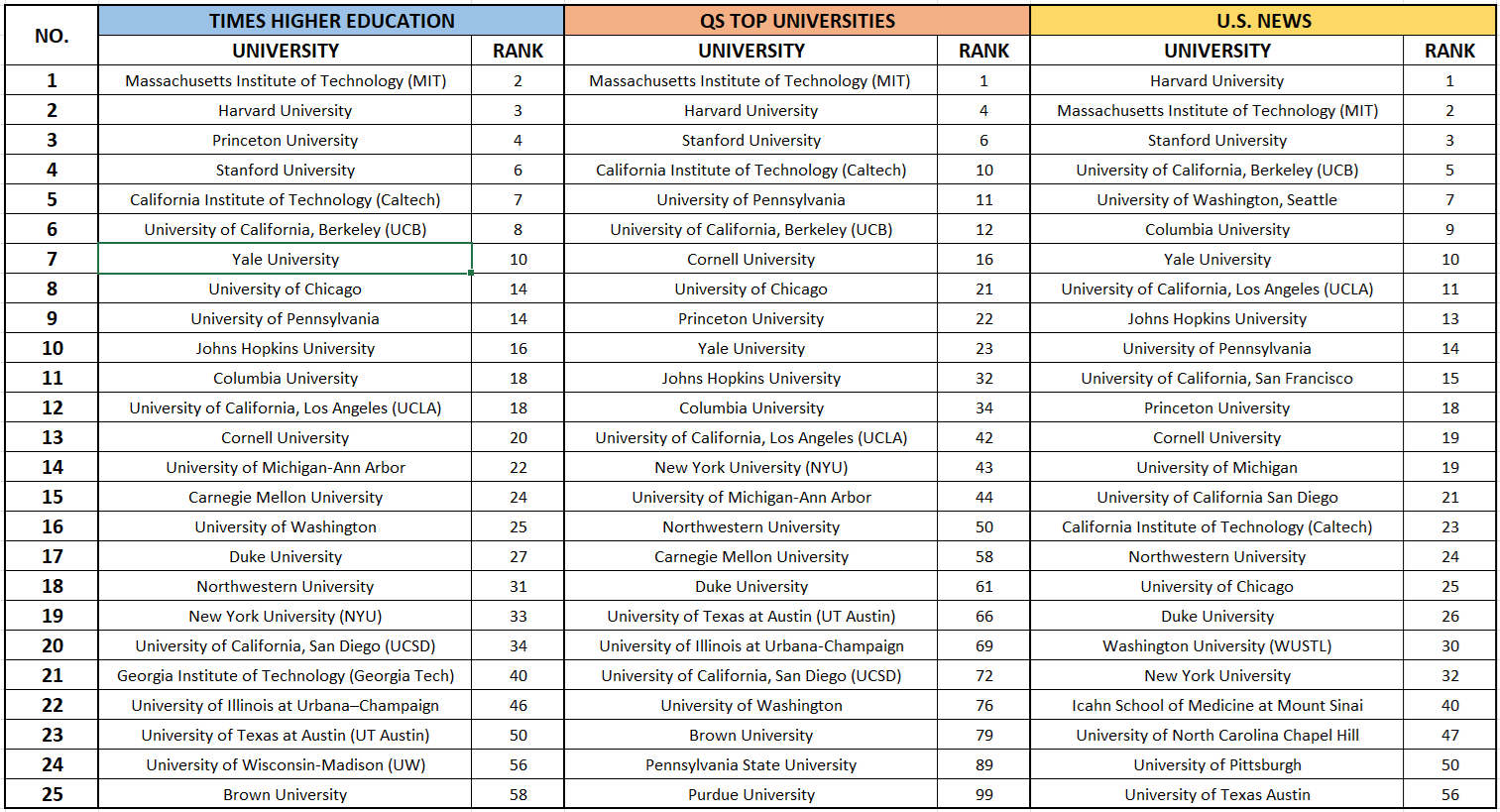UNITED STATES OF AMERICA
- World’s Most Prestigious Universities
- Flexible Education System
- Career Opportunities
- Cultural Diversity and Native English
- Financial Support Opportunities
Education System in the United States
Why Study Abroad?
Studying abroad goes beyond merely reading or practicing in a specific field, no matter your profession or branch. Those who have studied abroad represent a comprehensive set of values.
People who study abroad are individuals who leave their familiar surroundings, pursue their goals, and return having achieved them. They are seen as determined individuals who set goals, invest in those goals, take risks, act responsibly, and succeed. In a world where a large portion of society has never even traveled abroad, let alone studied there, people who adapt to a different culture and improve themselves truly deserve admiration.
Moreover, as mentioned earlier, studying abroad represents a unique set of values. These individuals are entrepreneurial, responsible, accustomed to multicultural environments, and enriched by diverse connections and opportunities. They have access to advanced techniques and knowledge, speak foreign languages, and use those skills for lifelong learning. Their capacity for socio-economic self-investment makes them stand out both in job interviews and social settings.
Why Choose the United States?
1. World’s Most Prestigious Universities
The United States is a global leader in education, boasting highly competitive universities consistently ranked at the top worldwide. Home to the largest number of institutions in the global top 100, the U.S. attracts over 1,000,000 international students annually.
The prestige of American universities and the global recognition of their diplomas make a significant impact in job applications. Simply having an education from the U.S. gives candidates an edge in HR evaluations. Schools like Harvard, MIT, and Stanford not only offer academic excellence but also open doors to international career opportunities.
With over 4,500 accredited universities, the U.S. is a hub for research and innovation. These institutions are equipped with modern laboratories and extensive resources, allowing students to participate in internationally recognized research projects supported by scholarships and incentives.
2. Flexible Education System
American universities offer a wide range of course selection options, giving students the freedom to tailor their programs to their interests and career goals. The system allows for major changes, ensuring your previous efforts are not wasted if your focus shifts. Opportunities for double majors, minors, master’s, and doctoral studies at prestigious institutions make it easier to specialize in multiple fields.
3. Career Opportunities
The U.S. hosts the world’s largest job market in STEM (Science, Technology, Engineering, and Mathematics) fields. With strategic networking, you can open new doors in virtually any discipline. Additionally, programs like OPT (Optional Practical Training) and CPT (Curricular Practical Training) provide work experience during and after your studies, giving you a competitive edge in the job market.
4. Cultural Diversity and Native English
The United States’ multicultural environment allows students to build extensive social networks. By interacting with people from diverse backgrounds, you enhance your cultural awareness and gain a global perspective. Moreover, graduates of American universities gain access to a prestigious alumni network that is respected worldwide.
The United States is one of the places where English is a native and widely spoken language. Studying the language here means learning English not only academically but also in daily life. It provides an ideal environment for those who want to improve quickly by practicing the language. Additionally, enhancing your English skills in your field can give you an edge in the global business world.
5. Financial Support Opportunities
Various scholarships, such as Fulbright, and university-based funding options are available to students. Additionally, the ability to work legally while studying helps ease financial burdens. The U.S. has also streamlined visa processes to facilitate international students. With F-1 and J-1 visa options, you can work during your studies and even stay in the U.S. after graduation.
Education System in the United States
The U.S. education system includes a 12-year pre-university education process. This covers kindergarten, elementary school, middle school, and high school, though the specifics can vary across states.

Structure Scheme for Education System
(Source: National Center for Education Statistics)
Students typically attend schools based on their local residence. While public schools do not charge tuition fees for education itself, families also have the option to choose tuition-based private schools.
The high school curriculum operates on a credit-based system. After fulfilling mandatory courses, students can select classes aligned with their interests. Learning takes place in classrooms organized by subjects. Students can transition between course levels, allowing high-performing individuals to take advanced classes in specific subjects. Additionally, academic options like AP (Advanced Placement) courses and extracurricular activities prepare students for university.
Higher education in the U.S. is not free. Students, whether attending public or private universities, are required to pay tuition. However, public universities are generally more affordable. Universities offer two main types of programs as 2-Year (Community Colleges) and 4-Year. Students can transfer from the 2-year programs to 4-year universities to complete their education.
In addition to world-renowned universities such as MIT, Harvard, Stanford, Princeton, Yale, CalTech, Duke, JHU, Northwestern, and UPenn, students can also choose prestigious Liberal Arts Colleges. These institutions, such as Williams, Amherst, Swarthmore, Bowdoin, Pomona, Wellesley, Carleton, Claremont McKenna, Harvey Mudd, and Vassar, focus on undergraduate education. Contrary to the term “college” in some languages, Liberal Arts Colleges are not high schools but elite higher education institutions.
Graduates of undergraduate programs receive degrees such as Bachelor of Arts, Bachelor of Science, or Bachelor of Fine Arts, depending on their field of study. Those aiming to advance academically can pursue master’s or doctoral programs, earning titles like Master, PhD, or MD, depending on their specialization and degree level.
Highlights
Language:
English
Visa Types:
F Visa – Suitable for students seeking full-time education at accredited universities, colleges, high schools, private elementary schools, seminars, conservatories, and language training programs.
J Visa – Suitable for students participating in cultural exchange programs at the high school or university level.
M Visa – Suitable for students enrolling in non-academic or vocational training programs.
Financing:
Options include scholarships, financial aid, grants, part-time work opportunities, and student loans.
Costs:
As education in the U.S. is not free, costs vary greatly depending on the school, program, and city of study. It is advisable to set expectations based on your budget and goals.
Exam:
Language Proficiency – TOEFL, IELTS, and Duolingo English Test. TOEFL is the most commonly preferred test.
Undergraduate Applications – SAT, ACT, CLT, AP, IB, A-Level.
Graduate Applications – GRE, GMAT.
Specialized Fields – MCAT (Medicine), LSAT (Law), USMLE (Medical Licensing).
and so forth. Additionally, having a good GPA, strong essays, and successful interviews are essential.
Top Universities
The table below is compiled from global university rankings conducted by Times Higher Education, QS Top Universities, and U.S. News. It lists the top 25 American universities and their global rankings in each list.

USA – Top 25 Universities
There are far more prestigious universities in the U.S. than we can list here, with advanced educational opportunities and resources. Therefore, to ensure your choices meet your needs and expectations, we recommend utilizing a more detailed guide in your research or seeking professional consultancy services.
Let’s Plan Together
Feeling confused, unable to find what you’re looking for, or unsure where to start? Let us help you.
As a first step, take the Free English Placement Test below. Knowing your level is crucial for planning your preparation phase. Next, explore our Country Guides for insights into cities, schools, or career opportunities. Alternatively, you can improve your skills by taking advantage of our Courses.
Remember, when you reach beyond borders, you don’t just go far—you find your place in the world.
Go far. Live More.